
Mere Production Of Document Will Not Prove Its Content, Absent Admissible Evidence: Kerala HC Refuses Retrial To 'Improve Case'
 |
|While explaining the importance of the presentation of original documents and related provisions mentioned under sections 59, 61 to 65 of the Indian Evidence Act, the Kerala High Court held that the retrial cannot be ordered merely on the ground that the prosecution did not produce proper evidence and did not know how to prove their case.
A Single Judge Bench of Justice Kauser Edappagath observed that “Section 386(b)(i) empowers the appellate court to order the re-trial of the accused. Though such power exists, it is trite that it should not be exercised in a routine manner. A de novo trial or retrial of the accused should be ordered by the appellate court in exceptional and rare cases, and only when, in the opinion of the appellate court, such course becomes indispensable to avert failure of justice. This power cannot be used to allow the prosecution to improve upon its case or fill up the lacuna”.
The Bench added that the guiding factor for retrial must always be the demand for justice.
The Bench further observed that mere production of a document would not prove its contents, and such content must be proved by admissible evidence, i.e., by the evidence of those who can vouchsafe for the truth of the facts in issue.
“It shall not be legal for the court to rely solely upon the recitals in the document as substantive evidence to decide whether the disputed facts exist or proved or not”, added the Bench.
Advocate S. Sreedev appeared for the Petitioner whereas Advocate S Rekha appeared for the Respondent.
The brief facts of the case were that the appellant was working as a Junior Superintendent in the office of the District Registrar (GL), during the period from March 1992 to Nov 1993. Allegedly, he abused his official position as a public servant, committed criminal misconduct by forging Essentiality Certificates, used the same as genuine, and obtained a medical reimbursement amount of ₹23,381/-, unauthorisedly, causing corresponding loss to the Government. Consequently, he faced trial of 17 cases altogether with a similar set of allegations. The court convicted and sentenced him a simple imprisonment for a period of three years each under Section 13(1)(d) read with 13(2) of the PC Act, simple imprisonment for a period of three years under Sections 468 of the IPC and simple imprisonment for a period of one year each under Sections 465 and 471 of the IPC.
After considering the submission, the Bench noted that the prosecution failed to adduce legally acceptable evidence to prove that the original Essentiality Certificates produced by the appellant, and the medical reimbursement claims were forged.
In the absence of such proof, the conviction of the appellant in none of the cases could be sustained, added the Bench.
Referring to the cases of Yashoda v. K. Shoba Rani (AIR 2007 SC 1721) and State of Kerala v. Sunil [2022 (1) KLT 512], the Bench reiterated that to admit a photocopy in evidence, it is necessary to lay the foundation of reception of secondary evidence, and the secondary evidence must be authenticated by foundational evidence that the alleged copy is in fact a true copy of the original.
The High Court also states that a party seeking to produce secondary evidence must explain the non-production/non-availability of primary evidence, and therefore, a party who proposes to produce a photo state copy of a document as secondary evidence on the ground that the original has been destroyed or lost is bound to prove the said fact to receive the photocopy in evidence.
Without laying down the said factual foundation for the reception of secondary evidence, the photostat copies cannot be admitted into the evidence at all, added the Court.
The High Court therefore acquitted the accused.
Cause Title: G. Chandrabhanu v. State of Kerala [Neutral Citation: 2023/ KER/ 46860]
Click here to read/download the Judgment